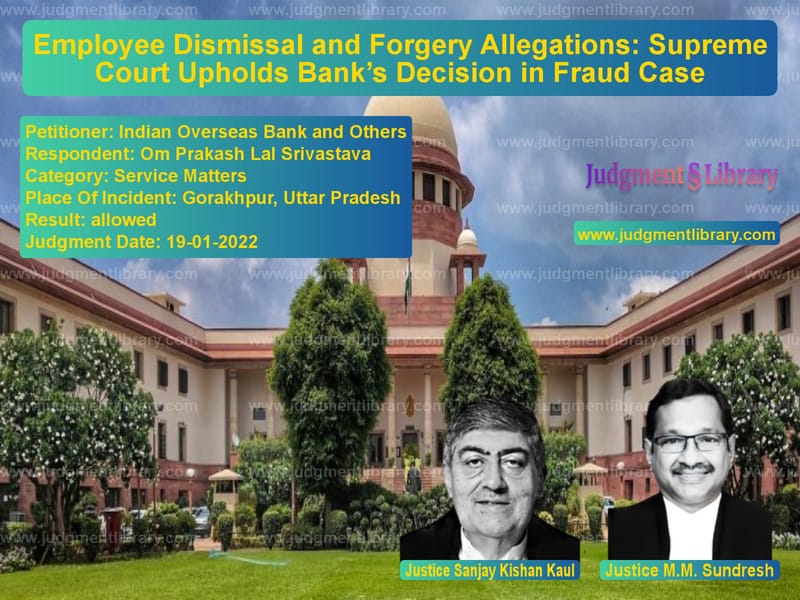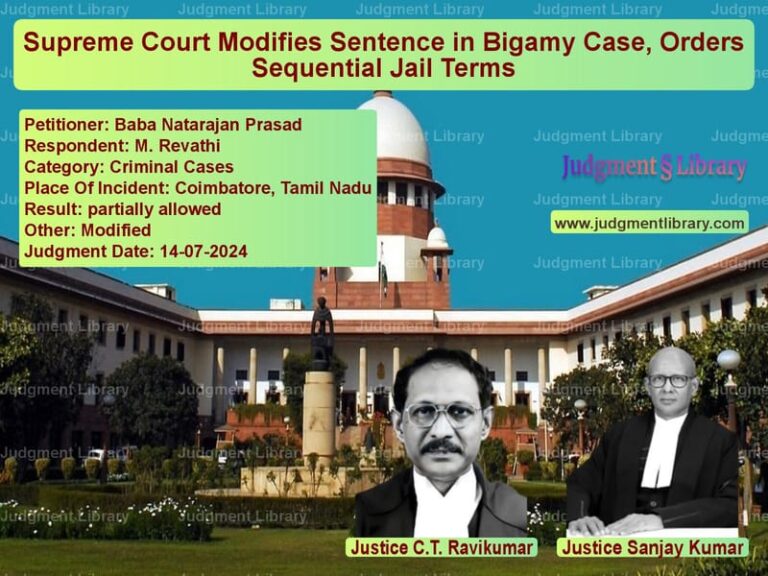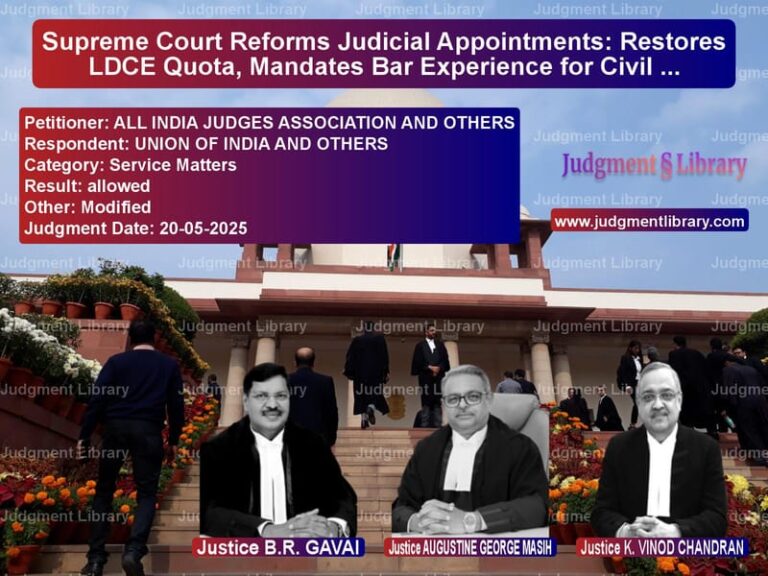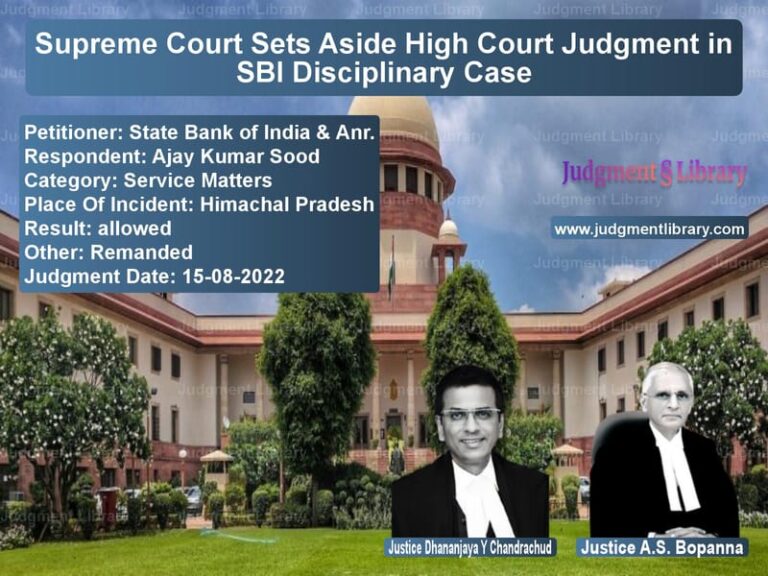Employee Dismissal and Forgery Allegations: Supreme Court Upholds Bank’s Decision in Fraud Case
The Supreme Court of India recently delivered a crucial verdict concerning the dismissal of a bank employee accused of fraud and forgery. The case, involving Indian Overseas Bank and an employee, Om Prakash Lal Srivastava, revolved around charges of serious misconduct, including the unauthorized opening of a joint bank account and misappropriation of funds. The Court upheld the bank’s decision to terminate the employee, setting a significant precedent on the standards of proof in disciplinary proceedings.
Background of the Case
The respondent, Om Prakash Lal Srivastava, was employed as a clerk-cum-cashier with Indian Overseas Bank since 1981. His dismissal was based on a series of charges, including insubordination, document manipulation, and forgery. The allegations were initiated following a complaint by the respondent’s sister-in-law, Smt. Meera Srivastava, who accused him of fraudulently opening a joint account in her name and misusing a demand draft issued as compensation for her deceased husband.
The charges framed against the respondent included:
- Failure to follow bank protocol regarding outward clearing cheques.
- Refusal to process cheques worth ₹2,21,161.47, causing inconvenience to customers.
- Forging his sister-in-law’s signature to open a bank account and withdraw ₹20,000.
- Engaging in disorderly behavior, including threatening the branch manager.
- Erasing official records to conceal wrongdoing.
Tribunal Proceedings and High Court Judgment
Following an inquiry, the bank’s disciplinary authority found all charges proven and dismissed the respondent from service in 1996. The dismissal was upheld by the appellate authority. The respondent then contested his termination before the Industrial Tribunal, which ruled in favor of the bank in 2013.
The respondent escalated the case to the Allahabad High Court, which ruled that five of the charges were unproven and remanded two charges (related to forgery) back to the Tribunal. The High Court argued that the signatures on the disputed documents should have been verified by a handwriting expert rather than solely relying on a banker’s assessment.
Supreme Court’s Observations
The Supreme Court, presided over by Justices Sanjay Kishan Kaul and M.M. Sundresh, found flaws in the High Court’s approach, stating that it had mistakenly applied criminal law standards to a departmental inquiry. The Court reaffirmed the principle that disciplinary proceedings rely on the preponderance of probabilities rather than the standard of proof beyond a reasonable doubt.
Quoting from Ashoo Surendranath Tewari v. Deputy Superintendent of Police, EOW, CBI, the Court stated:
“The standard of proof in departmental proceedings, being based on preponderance of probability, is somewhat lower than the standard of proof in criminal proceedings where the case has to be proved beyond reasonable doubt.”
Final Verdict
The Supreme Court ruled that the Industrial Tribunal’s findings were well-reasoned and based on substantial evidence, including the complainant’s testimony and the bank’s internal verification. The Court emphasized:
Read also: https://judgmentlibrary.com/supreme-court-upholds-dismissal-of-msrtc-driver-in-fatal-accident-case/
“The High Court has fallen into an error in coming to the conclusion in the impugned judgment and directing, once again, the matter to be remitted to the Industrial Tribunal.”
The Supreme Court set aside the High Court’s judgment and reinstated the Tribunal’s decision, affirming the respondent’s dismissal.
Implications of the Judgment
This ruling is pivotal for employment law and disciplinary proceedings in India. Key takeaways include:
- Judicial review of disciplinary actions should not equate departmental inquiries with criminal trials.
- Employers retain the authority to act on clear evidence of misconduct.
- The decision reinforces the importance of procedural fairness while upholding accountability.
Conclusion
The Supreme Court’s judgment reinforces the legal distinction between departmental inquiries and criminal trials. By upholding the bank’s decision, it affirms that financial institutions can take stringent measures against employees involved in fraud and forgery. The ruling ensures that disciplinary processes remain effective while respecting principles of fairness and due process.
Petitioner Name: Indian Overseas Bank and Others.Respondent Name: Om Prakash Lal Srivastava.Judgment By: Justice Sanjay Kishan Kaul, Justice M.M. Sundresh.Place Of Incident: Gorakhpur, Uttar Pradesh.Judgment Date: 19-01-2022.
Don’t miss out on the full details! Download the complete judgment in PDF format below and gain valuable insights instantly!
Download Judgment: indian-overseas-bank-vs-om-prakash-lal-sriva-supreme-court-of-india-judgment-dated-19-01-2022.pdf
Directly Download Judgment: Directly download this Judgment
See all petitions in Disciplinary Proceedings
See all petitions in Employment Disputes
See all petitions in Termination Cases
See all petitions in Judgment by Sanjay Kishan Kaul
See all petitions in Judgment by M.M. Sundresh
See all petitions in allowed
See all petitions in supreme court of India judgments January 2022
See all petitions in 2022 judgments
See all posts in Service Matters Category
See all allowed petitions in Service Matters Category
See all Dismissed petitions in Service Matters Category
See all partially allowed petitions in Service Matters Category







